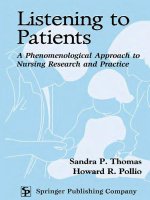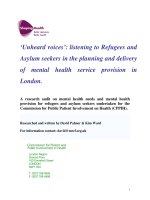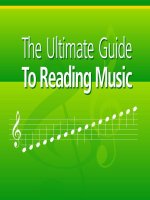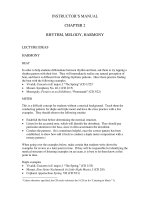ESL podcast 871 – listening to club music
Bạn đang xem bản rút gọn của tài liệu. Xem và tải ngay bản đầy đủ của tài liệu tại đây (87.59 KB, 9 trang )
English as a Second Language Podcast
www.eslpod.com
ESL Podcast 871 – Listening to Club Music
GLOSSARY
club – a dance club; a building with a large, open area where people can dance
while listening to music, usually a business that serves alcoholic beverages
* Noemi and her friends like dancing, so they often go to clubs on weekends.
DJ – disk jockey; a person who decides what songs to play and in what order,
often speaking between the songs, especially on the radio, at a dance club, or at
a special event like a wedding
* Did you listen to the radio this morning? The DJ played some great new music
by a band I had never heard of before.
to spin – to be a DJ; to play recorded music, especially in a club
* Trent is a DJ and he loves his job when he gets to spin the records he likes, but
sometimes his clients want to pick all the songs.
mix – a recorded song that has been rearranged and/or combined with other
songs in some way
* Sheila loves listening to unusual mixes, like classical music mixed with rap
lyrics.
mixed drink – a drink made with alcohol and juice, coffee, or cream, usually with
a sweet taste
* Jill’s favorite mixed drink is a sea breeze, which contains vodka, cranberry
juice, and grapefruit juice.
pumped up – excited, enthusiastic, and energetic; ready to do something
* The coach gave a great speech that got his team pumped up for the big game.
to sample – to use a small part of a song to create a new song
* Most musicians are flattered when other musicians sample their songs, as long
as they give them credit.
track – one song on a CD, associated with a number
* Why would you buy a CD with the whole album if you’re just going to listen to
the same track over and over again?
pounding beat – a very strong rhythm in a song, especially for dancing
* Soon everyone in the room was moving to the band’s pounding beat.
1
These materials are copyrighted by the Center for Educational Development (2013). Posting of
these materials on another website or distributing them in any way is prohibited.
English as a Second Language Podcast
www.eslpod.com
ESL Podcast 871 – Listening to Club Music
dance floor – a large, open area where people can dance, usually at a dance
club or special event
* Everyone fell silent and watched as the bride and groom stepped onto the
dance floor.
to segue – to transition into something very smoothly; without a break or pause
* How in the world did our conversation segue from national politics to the mating
practices of bees?
mellow – calm and relaxing; not exciting or loud
* Michael has such a mellow personality. I don’t think I’ve ever seen him get
angry.
club music – the type of music normally played at dance clubs, usually very
loud, electronic music, and perhaps experimental or hip-hop
* Why does the club music have to be so loud? I can’t even hear myself think!
to sit this one out – to not participate in something right away, but maybe wait
for the next opportunity, used especially when one does not want to dance to the
current song
* When James asked Evelyn to dance, she explained that she had been dancing
all evening and wanted to sit that one out, but that she would love to dance with
him once the next song started playing.
volume – a measure of how loud or quiet something is
* As Dad gets older, he likes to have the volume higher and higher on the TV.
Maybe he should have his hearing tested.
to turn (something) up – to increase the level of something, especially volume
or temperature
* If you’re cold, we can turn up the temperature setting on the heater.
2
These materials are copyrighted by the Center for Educational Development (2013). Posting of
these materials on another website or distributing them in any way is prohibited.
English as a Second Language Podcast
www.eslpod.com
ESL Podcast 871 – Listening to Club Music
COMPREHENSION QUESTIONS
1.
a)
b)
c)
What kind of club are Anastasia and Joshua in?
An organization where they have to pay membership dues.
An association of people who like different kinds of music.
A building where people can go to dance and have fun.
2.
a)
b)
c)
What kind of music would Joshua prefer to hear?
Something that is louder.
Something that is calmer or slower.
Something that is more exciting.
______________
WHAT ELSE DOES IT MEAN?
club
The word “club,” in this podcast, means a dance club, or a building with a large,
open area where people can dance while listening to music, usually a business
that serves alcoholic beverages: “The night before his wedding, Lyle’s friends
took him to a local club for his last evening as a single man.” A “strip club” is a
place where female performers dance while taking off their clothes: “Rebecca
was shocked, angry, and sad when she learned that her husband had gone to a
strip club.” Finally, a “country club” is a facility where rich people pay a lot of
money to be members so that they can enjoy social events, a gym, a golf club,
and more: “The country club has a beautiful golf course and swimming pool, but
most of the members join to meet other successful businesspeople.”
to sample
In this podcast, the verb “to sample” means to use a small part of a song to
create a new song: “One of the most sampled songs in hip-hop is The Payback
by James Brown.” The verb “to sample” also means to take a small piece of
something and eat it or use it in some way: “Would you like to sample any of our
wines?” The verb “to sample” can also mean to try something once to find out
whether one likes it, without an obligation to continue: “The music center offers
special events where prospective students can sample a music class without
signing up for a full semester.” Finally, when talking about data collection, “to
sample” means to ask a small group of people certain questions to learn about
the larger group: “The evaluators sampled 20% of the program’s participants.”
3
These materials are copyrighted by the Center for Educational Development (2013). Posting of
these materials on another website or distributing them in any way is prohibited.
English as a Second Language Podcast
www.eslpod.com
ESL Podcast 871 – Listening to Club Music
CULTURE NOTE
House Music
“House music” is a type of electronic dance music. It first appeared in the early
1980s in Chicago, Illinois. Some people think the name “house music” “was
derived from” (came from) the name of a Chicago nightclub, The Warehouse,
which was one of the first places where the music became popular.
The music is characterized by the use of “drum machines” (an electronic
machine that produces the sounds of drums without using actual drums) and
“synthesized” (electronic) “bass lines” (the low-pitched, simple melodies
traditionally played on a bass guitar). The “rhythm” (beat) tends to be very
repetitive, and in some ways the rhythm is more important than the melody. The
“kick drum” (bass drum, a large drum that has a low pitch) is played on every
beat, four times in a “measure” (section of music and a way of counting the
number of beats in a song). House music has few or no “vocals” (singing), but
when it does have “lyrics” (words that are sung in a song), they often “convey”
(express) political messages.
Disco was influence by house music, which “dabbled in” (tried a little bit of)
electronic music. House music takes some elements of disco music and makes
them “fully” (entirely; completely) electronic and more repetitive.
Today, house music is “mainstream” (commonplace; accepted by many or most
people). Famous “recording artists” (musicians) like Madonna and Janet Jackson
have “incorporated” (integrated; adopted and used) elements of house music into
their own performances.
______________
Comprehension Questions Correct Answers: 1 – c; 2 – b
4
These materials are copyrighted by the Center for Educational Development (2013). Posting of
these materials on another website or distributing them in any way is prohibited.
English as a Second Language Podcast
www.eslpod.com
ESL Podcast 871 – Listening to Club Music
COMPLETE TRANSCRIPT
Welcome to English as a Second Language Podcast number 871: Listening to
Club Music.
This is English as a Second Language Podcast episode 871. I’m your host, Dr.
Jeff McQuillan, coming to you from the Center for Educational Development in
beautiful Los Angeles, California.
Our website is ESLPod.com. Go there to download a Learning Guide for this
episode that will help you improve your English faster than ever.
This episode is a dialog between Anastasia and Joshua, about going somewhere
to listen to a specific kind of dance music. Let’s get this party started.
[start of dialog]
Anastasia: This is the best club in the city. Grace brought me here last month.
You’re going to love it.
Joshua: What?!
Anastasia: You’re going to love this club. It has the best DJ in town. She spins
the best mixes.
Joshua: Did you say you’re going to get us some mixed drinks?
Anastasia: No, I said that this DJ is great. She plays music that gets people
pumped up. Oh, I love this song. It samples from two of my favorite songs and
it’s my favorite track on this CD.
Joshua: Did you say that you want to buy this CD?
Anastasia: No, I said I like this song. It’s got a pounding beat and I can really
feel the music. I love dancing to it. Do you want to get out onto the dance floor?
Joshua: Let’s wait until she segues into something mellower. I don’t really like
dancing to this kind of club music.
Anastasia: What?! You love club music? That’s great. Let’s go dance!
5
These materials are copyrighted by the Center for Educational Development (2013). Posting of
these materials on another website or distributing them in any way is prohibited.
English as a Second Language Podcast
www.eslpod.com
ESL Podcast 871 – Listening to Club Music
Joshua: I think I’ll sit this one out. Don’t you think that the volume is a little loud
in here?
Anastasia: What?! You want the music to be louder? I’ll go ask the DJ to turn it
up.
Joshua: No!
[end of dialog]
Anastasia begins by saying to Joshua, “This is the best club in the city.” A “club”
(club) in this case refers to a dance club, a building with a large open area where
people can dance and listen to music – usually modern music that is easy to
dance to or, at least, some people think it’s easy to dance to. I do not.
Anastasia says, “Grace brought me here last month. You’re going to love it.”
Joshua, however, is having difficulty hearing Anastasia because it’s so loud in
the dance club. This, of course, is quite common. They play their music very loud
and it’s very difficult to talk to someone. So, Joshua says, “What?” because he
didn’t hear Anastasia. Anastasia repeats herself. She says, “You’re going to love
this club. It has the best DJ in town.”
A “DJ” is a disc jockey. That’s the person who decided which songs are going to
be played and in what order. You’ll often find a DJ on a radio station or at a
dance club like this. Anastasia says the DJ “spins the best mixes.” “To spin”
(spin) here means specifically to play recorded music, to be a DJ in a club. “Spin”
can also mean to move something around in a circular way and of course, in the
old days, when we used to play these vinyl things called “records,” they would
spin around in a circle. Even your CD’s, your compact discs, did that. Now, with
MP3’s and other kinds of digital music, nothing has to spin around physically, but
we still use this verb “spin.”
This DJ, according to Anastasia, spins the best mixes. A “mix” (mix) is when you
take two or more songs and you combine them together so that it’s almost like
one song. Joshua says, “Did you say you’re going to get us some mixed drinks?”
“Mixed (mixed) drinks” have nothing to do with mixes like recorded songs. A
“mixed drink” is a drink with alcohol and some other liquid like juice, coffee, or
cream. Often it has a sweet taste, though not always. It’s a kind of alcoholic drink
that you would find in a dance club for adults like this.
Anastasia says, “No. I said that this DJ is great.” In other words, Joshua isn’t
understanding what Anastasia is saying. He thought she said something about
6
These materials are copyrighted by the Center for Educational Development (2013). Posting of
these materials on another website or distributing them in any way is prohibited.
English as a Second Language Podcast
www.eslpod.com
ESL Podcast 871 – Listening to Club Music
getting mixed drinks, when in fact, she was talking about spinning mixes.
Anastasia says the DJ plays music that gets people pumped up. “To be pumped
(pumped) up” means to be excited, to be enthusiastic, to be ready to do
something.
Pump up the jam, pump it up…
That’s a line from a dance song from, I don’t know, many years ago. “Pump up
the jam.” “The jam” is probably just the music there – the mix.
Pump up the jam, pump it up…
That’s what dance music is like. You can tell why I’m not a very good dancer.
Anyway, Anastasia says, “The music gets people pumped up.” “Oh I love this
song,” she says. “It samples from two of my favorite songs and it’s my favorite
track on this CD.” “To sample” (sample) here means to take a small part of a
song and create a new song with it. So, it’s similar to a mix but usually, when
you’re sampling, you’re just taking a very small part, maybe just ten seconds or
so from another song and making it part of a new song. That’s what sampling
involves. Sampling usually has a new song that is combined with an older song
or part of an older song.
This particular song that Anastasia loves is one of her favorite songs. “It’s my
favorite track in this CD.” We talk about one song on a compact disc or one song
on an old record album as being a “track.” We also use the term now for MP3’s
on iTunes, for example. You can have a track. A “track” (track) is one song.
Joshua says, “Did you say that you want to buy this CD?” Notice again, Joshua is
just not understanding what Anastasia is saying because it’s so loud in that
particular place. Anastasia says, “No. I said I like this song. It’s got a pounding
beat and I can really feel the music. I love dancing to it.” A “pounding beat” is a
very strong rhythm in a song, especially for dancing. If you go to a dance club,
that’s pretty much all you can hear. It’s that pounding beat that people use in
order to dance to help them dance, I guess. It’s probably a combination of the
alcohol and the pounding beat that gets them to dance.
Anastasia says to Joshua, “Do you want to get out onto the dance floor?” “To get
out onto” means to go, in this case, to a place where you can dance. The “dance
floor” is part of the area in the dance club where everyone goes to dance. They,
of course, also have tables in the dance club, for people to sit and drink and try to
talk to beautiful women who don’t want to talk to you.
7
These materials are copyrighted by the Center for Educational Development (2013). Posting of
these materials on another website or distributing them in any way is prohibited.
English as a Second Language Podcast
www.eslpod.com
ESL Podcast 871 – Listening to Club Music
Joshua says, “Let’s wait until she” – the DJ – “segues into something mellower.”
“To segue” (segue) means to transition or move from one thing to another, very
smoothly, without any breaks or any pauses. It’s sort of a more formal word. You
wouldn’t expect it to be used in a dance club, but there it is. The DJ is going to
segue into something, Joshua hopes, that is more mellow, that is “mellower”
(mellower). Something that is mellower is something that is calmer, that is more
relaxing, that is not quite as exciting or loud.
Joshua says, “I don’t really like dancing to this kind of club music.” We talked
about a dance club as a place where you can go to dance, or simply a club.
“Club music,” then, is the kind of music you typically hear at a dance club. It’s
usually very loud. It is often what we call “electronic music.” All of the music is
made by machines and computers rather than, say, an actual piano or a drum.
Anastasia says, “What? You love club music?” Of course she didn’t hear what
Joshua said. “That’s great. Let’s go dance.” So, the two of them aren’t
communicating because of the loud noise. Joshua then says, “I think I’ll sit this
one out.” “To sit something out” means not to participate in something, at least,
not participating right away, maybe wait a little while for the next opportunity. So,
there’s a song on and you don’t really like it and you don’t want to dance to it.
You may say to your boyfriend or girlfriend or dog, if you bring your dog to the
dance club, as I do, “Let’s sit this one out. I don’t want to dance to this song.
We’ll dance to the next one.” And your dog goes, “Woof, woof!” (I’m crazy, I
know.)
Joshua says, “Don’t you think that the volume is a little loud in here?” The
“volume” (volume) is how loud something is or how quiet it is. That’s the volume.
Anastasia says, “What? You want the music to be louder?” She again doesn’t
understand Joshua and thinks Joshua wants the music to be even louder than it
is now. She says, “I’ll go ask the DJ to turn it up.” “To turn something up” means
to increase the level of something, especially when we’re talking about volume –
on a television or on a radio. It could also be talking about temperature. “I’m
going to turn up the heater.” I’m going to make the heater give us more heat so
it’s warmer in here. Joshua, at the end, simply says, “No!” meaning, no, he
doesn’t want the music to be louder.
Now let’s listen to the dialog this time, at a normal speed.
[start of dialog]
Anastasia: This is the best club in the city. Grace brought me here last month.
You’re going to love it.
8
These materials are copyrighted by the Center for Educational Development (2013). Posting of
these materials on another website or distributing them in any way is prohibited.
English as a Second Language Podcast
www.eslpod.com
ESL Podcast 871 – Listening to Club Music
Joshua: What?!
Anastasia: You’re going to love this club. It has the best DJ in town. She spins
the best mixes.
Joshua: Did you say you’re going to get us some mixed drinks?
Anastasia: No, I said that this DJ is great. She plays music that gets people
pumped up. Oh, I love this song. It samples from two of my favorite songs and
it’s my favorite track on this CD.
Joshua: Did you say that you want to buy this CD?
Anastasia: No, I said I like this song. It’s got a pounding beat and I can really
feel the music. I love dancing to it. Do you want to get out onto the dance floor?
Joshua: Let’s wait until she segues into something mellower. I don’t really like
dancing to this kind of club music.
Anastasia: What?! You love club music? That’s great. Let’s go dance!
Joshua: I think I’ll sit this one out. Don’t you think that the volume is a little loud
in here?
Anastasia: What?! You want the music to be louder? I’ll go ask the DJ to turn it
up.
Joshua: No!
[end of dialog]
She doesn’t normally spin mixes in a dance club, I don’t think. But she does write
wonderful scripts. I speak of our wonderful scriptwriter, Dr. Lucy Tse. Thank you,
Lucy.
From Los Angeles, California, I’m Jeff McQuillan, thank you for listening. Come
back and listen to us again, right here on ESL Podcast.
English as a Second Language Podcast is written and produced by Dr. Lucy Tse,
hosted by Dr. Jeff McQuillan. Copyright 2013 by the Center for Educational
Development.
9
These materials are copyrighted by the Center for Educational Development (2013). Posting of
these materials on another website or distributing them in any way is prohibited.









